- Home
- Mary Downing Hahn
A Haunting Collection Page 3
A Haunting Collection Read online
Page 3
Dropping her suitcases at the foot of a narrow flight of steps, Dulcie pointed down the hall. “Two bedrooms—one for Emma and one for me. Plus a brand-new bathroom.”
My room was upstairs, tucked snugly under the eaves. A faded patchwork quilt in shades of blue, yellow, and green calico covered the double bed. Its iron frame had been painted white to match an old dresser and a table and chair as well as built-in shelves, already holding books and toys. Fresh muslin curtains hung at the windows, and a rag rug covered most of the floor.
“This was your mom’s and my room when we were kids,” Dulcie said. “Same wallpaper, same furniture.”
She picked up a conch shell lying on the bureau and turned it slowly, studying its shape and colors before putting it back. “Our mother left everything here. I guess she thought we’d come back one summer, but we never did.”
Her voice had dropped so low, I barely understood what she’d said.
“Why didn’t you come back?” I asked. “Did something happen?”
Dulcie stared at me. “Of course nothing happened. Whatever gave you that idea?”
“Mom, I guess. The way she talks about the lake, like it’s a scary place.” Suddenly embarrassed, I picked up the shell Dulcie had been looking at. “This is really pretty.”
“Let me see.” Emma reached for the shell, and I handed it to her. She held it as carefully as if it were made of glass and pressed it to her ear. “I hear the ocean,” she whispered.
Dulcie looked at me over Emma’s head. “Everything scares Claire,” she said. “Deep water. High places, low places. Inside, outside. Upside, downside.”
Even though I’d often thought the same thing, Dulcie’s tone of voice stung. Mom was lying in bed at home, sick, in pain, while I’d traveled all this way without her. “She can’t help it. She worries, that’s all.”
Dulcie shrugged. “To answer your question, I guess we didn’t come back because we got tired of coming here. For kids, there’s not a whole lot to do. We spent our summers traveling instead—Yellowstone, the Grand Canyon, Yosemite, Niagara Falls, the Canadian Rockies.” She laughed. “Dad did a lot of driving in those years.”
Emma picked up one of a pair of teddy bears sitting in a small rocking chair. “He looks just like Mr. Bear,” she said.
“He belonged to Claire,” Dulcie said. “And that’s just what she called him. Mr. Bear.”
“That’s the bear’s name in The Lonely Doll. Mr. Bear and Little Bear, the friends Edith wishes so hard for.” Emma hugged the bear. “If I wish hard enough, will a friend come?”
Dulcie leaned down to kiss Emma’s cheek. “Just wait till you start kindergarten in the fall. You’ll have so many friends, you won’t have to wish.” She smoothed her daughter’s silky hair back from her face, tucking it behind her ears.
“Does Mr. Bear belong to you now?” Emma asked me.
“You can have him,” I told her. “I think he likes you best of all.”
Emma grinned and hugged the bear. “And you can have the other one.”
“He was mine.” Dulcie picked up the bear, a sad companion to Mom’s. His fur was almost worn off, stuffing leaked from one paw, and he was missing an eye.
“Poor old thing,” Dulcie said. “Claire took good care of her toys, but I was rough on everything—toys, clothes, books. Even people.”
She sighed and gave the bear a hug. “His name is Rufus M., after the little boy in the Moffat Family books.” Dropping the bear on the foot of the bed, she stretched. “I guess it’s time to start dinner.”
5
When Dulcie was gone, Emma sat on the bed and watched me put my things into the bureau drawers. “Is Aunt Claire mad at Mommy?” she asked. “Is that why she didn’t come down to see us before we left?”
I shook my head. “My mom gets awful headaches,” I told Emma. “They’re called migraines. When she has a really bad one, she stays in bed and doesn’t talk to anyone.”
“Poor Aunt Claire.” Emma stroked Mr. Bear’s fur. “I’ll make her a get-well card tomorrow. It’ll be from me and Mr. Bear. Would she like that?”
I grinned. “She’d love a card, especially from you.”
Emma looked at me thoughtfully. “Aunt Claire doesn’t like the lake, does she? She almost didn’t let you come with me and Mommy.”
I opened the casement window and leaned out to look at the water. The evening star hung low in the sky, kept company by a half-moon, but it was still light enough to make out the horizon, a dark line against the fading pink of the sunset.
“My mom’s scared of water,” I said. “I’ve never seen her go swimming. Not once. Even when she took me to the pool for lessons, she sat on the grass and watched me. All the other mothers were in the water with their kids. But not my mother.”
Beside me, Emma shuddered. “Maybe she thinks she’ll drown. She doesn’t want her bones to come out.”
I looked at her. “What are you talking about?”
“Bones are inside us, you and me and Mommy and everybody. When we die they come out, and then we’re ghosts.”
“Where did you get that idea?”
“I saw pictures in Mommy’s drawing books. She said they’re skeletons. We all have them inside—until we die, and then . . .” Emma hugged Mr. Bear. “He doesn’t have bones, just stuffing. And he’s not alive, so he can’t die. Or be a ghost.”
“There’s no such thing as ghosts.”
Emma turned her hands this way and that, as if observing the movement of the bones under her skin. “How do you know? Maybe you just haven’t seen one.”
“Don’t be a Silly Billy.” I forced myself to laugh. “Of course I haven’t seen a ghost. And neither have you.”
“I’ve seen one in my dreams.” Emma spoke so softly I had to lean down to hear her. “The ghost is very sad and lonely. She wants to go home, but she’s down deep, deep, deep in the water. She’s been there so long, she’s just bones. No one knows where she is.”
Emma’s whispery voice made my skin race with goose bumps. I pulled her small body close to mine and hugged her. Mr. Bear’s fur tickled my nose. “That’s very scary,” I told her, “but it’s just a bad dream. Everybody has them.”
Emma peered into my eyes. “Do you?”
I thought about “T.” I hadn’t dreamt about her for weeks—until last night. I must have been worried about coming to the lake, leaving Mom, all that. I hoped I wouldn’t dream about her now that I was actually here.
“Not very often,” I fibbed to keep from alarming Emma.
While we’d been talking, the room had darkened. Shadows gathered in the corners, and a cool breeze fluttered the curtains. Somewhere outside a bird cried once . . . twice . . . three times.
I took Emma’s hand and led her toward the stairs. “Let’s go see what your mom’s doing.”
In the brightly lit kitchen, Emma ran to Dulcie. “Mr. Bear wants dinner,” she said, waving him at her mother. “He’s hungry.”
Dulcie gave her a kiss. “It’s almost ready. Why don’t you and Ali set the table? The forks and knives and spoons are in that drawer.” She pointed to the cabinet by the sink, and Emma began counting out the utensils—four of each.
“There’s only three of us,” I said.
“You forgot Mr. Bear.” Emma sat the teddy in the extra chair and laid a fork, knife, and spoon in front of him.
I laughed a little louder than I’d meant to, in relief, I guess, that Mr. Bear was joining us . . . not the ghost from Emma’s dream.
Dulcie brought over a big yellow bowl of spaghetti and set it down in the middle of the table. “The sauce isn’t as good as my ex-mother-in-law’s,” she said, “but it’s not bad with plenty of parmesan sprinkled on top.”
She tucked a napkin around Emma’s neck and served us each a heaping portion.
“Don’t forget Mr. Bear,” Emma said. “He hasn’t had anything to eat for years and years and years.”
Dulcie put a small amount on a saucer and set it in front
of the bear. “Eat up,” she told him. “I don’t like bears who waste food.”
After dinner, Dulcie lit a fire. Emma and I sprawled on the rug and roasted marshmallows. I let mine turn black on the outsides and sucked the gooey white insides into my mouth. “Yum.”
“Ugh,” said Emma. She liked hers barely toasted, but Dulcie burned hers even blacker than mine.
We washed the marshmallows down with hot chocolate, then lay still and watched the flames devour the logs. Our faces felt warm, but our feet were cold.
On the sofa, Dulcie sighed happily and stretched her long legs toward the fire. “I’d forgotten how chilly Maine gets at night,” she said. “We’ll need extra blankets. And cozy flannel jammies.”
Emma yawned and rubbed her eyes.
“Looks like someone’s ready for bed.” Dulcie scooped her up and gave her a hug. “Let’s go, sleepyhead.”
“You come, too.” Emma stretched her arms toward me. “And bring Mr. Bear. He’s scared of the dark.”
Carrying the bear, I followed Dulcie and Emma to the small room at the back of the cottage. As soon as Emma was ready for bed, she found The Lonely Doll and handed it to Dulcie. “Read this one.”
“But I read that book last night and the night before and the night before that—”
“It’s my favorite,” Emma insisted. She climbed into bed and tucked the bear under the covers beside her. “I bet Ali wants to hear it—don’t you?”
“Sure.” I stretched out on the bed beside Emma and listened to Dulcie begin the story.
After she’d read a few pages, Emma interrupted her. “It’s so dark outside my window. Why aren’t there any lights or any people? I don’t even hear any cars.”
“We’re out in the country now, Em, where it’s peaceful and quiet.”
“Will you pull down the shades so I don’t have to see the dark? Ghosts could be out there, watching me.”
Before Dulcie could move, I jumped up and shut out the night with a few yanks on the blinds. Emma was right. It was dark out there. Very dark. No lights anywhere. No sounds but the lapping of the lake against the shore and the wind in the treetops. The cottage was spooky at night, dark, full of shadows, not at all the way it was in the daytime.
“There,” I said. “Is that better?”
“I guess so.” Emma’s voice was low, almost a whisper. She held Mr. Bear tightly. “Read, Mommy.”
Dulcie read three Lonely Doll books, as well as The Cat in the Hat, The Cat in the Hat Comes Back, Horton Hatches the Egg, and The Owl and the Pussycat. But it was Goodnight Moon that finally lulled Emma to sleep.
Leaving a night-light glowing, Dulcie tiptoed out of the room, and I followed. She closed the door softly and leaned against it for a moment.
“Let’s hope Emma adjusts to nights in the wilderness quickly,” she said. “I could barely stay awake to read those books.”
She yawned and gave me a hug. “I’m beat from all that driving, Ali. I’m going to put out the fire and get into bed.”
More tired than I’d realized, I climbed the stairs to my room. Trying to ignore the darkness beyond the bedside lamp, I snuggled under Great-Grandmother’s quilt and opened To Kill a Mockingbird, number one on my school’s summer reading list. I’d seen the movie, but I’d never read the novel. Dad said the book was even better than the movie, but Mom said nothing could beat Gregory Peck as Atticus Finch.
My bed faced the casement windows, slightly open to the cool night air. Through the pine branches, I could see the moon, tipped into a crooked smile. Insects chirped, an owl hooted, the pines sighed in the breeze, and the lake washed against the shore.
With Rufus M. tucked in beside me, I tried to read, but after half an hour, I gave up. It wasn’t the book. I loved the story, and I loved the way Harper Lee wrote. I simply couldn’t stay awake another second.
I closed my eyes, expecting to fall asleep immediately. But the moon shone in my face. In the woods, the orchestra of insects chirped and thrummed and buzzed, louder and louder.
I found myself thinking of Mom and Dulcie, sharing this bed when they were younger than I was. Had they talked and giggled together? Or had they quarreled the way they did now?
I hugged Rufus. “If you could talk, you’d tell me,” I whispered to the old bear. “You were there.”
His glass eye glittered in the moonlight, giving him a slightly wicked look. But if the bear knew anything about those long-ago summers, he wasn’t telling. Like Mom and Dulcie, Rufus M. knew how to keep secrets.
6
It rained during the night. In the morning it was still coming down, darkening the lake to black and blurring the trees. The air smelled like wet earth and old leaves. A squirrel perched on the deck’s railing, his droopy tail wet and pitiful. A few sparrows hopped about here and there, looking almost as wretched as the squirrel.
After breakfast, Dulcie handed out umbrellas and led Emma and me down the steps to the dock. Flinging open the door of the small shingled building, she said, “My studio. Isn’t it marvelous?”
Large skylights let in the gray light of the rainy day. Blank canvases leaned against the walls, primed and ready to paint. A long table ran along the back wall, holding paints and brushes, stacks of drawing paper, and books. Above it, built-in shelves bulged with more art supplies and books.
A wood stove and a couch draped with a faded paisley print bedspread occupied one corner, along with a couple of well-worn easy chairs and the potter’s wheel Dulcie used to make bowls, mugs, and platters.
I breathed in the smells of paint, turpentine, and linseed oil mingled with lake water and damp, mossy woods. “It’s perfect,” I said. “I want one just like it!”
Dulcie smiled and pointed to an easel in the middle of the studio. “What do you think of my latest?”
I stared at the large oil, washed in shades of blues, greens, and grays, splashed with flashes of yellow and white. “It makes me think of water.”
Dulcie grinned. “It’s the first of a series based on the lake and its moods.” She turned to the window and stared at the water, dull and gray in the rain. “I want to capture the power in water and rocks and trees—capture it as it captures me.” She stood silently for a few moments, toying with a long strand of curly hair. Almost as an afterthought, she added, “Maybe I’ll manage to free myself.”
I wasn’t sure what she meant or even if she were talking to me, so I simply nodded.
“Mommy, can I show Ali my pictures?” Emma asked.
Without looking at either of us, Dulcie said, “Of course. Your folder’s on the table.”
Emma carefully untied the strings holding her folder closed and began spreading pictures on the table. “I made these in New York,” she explained, “and the moving truck brought them here, just like it brought Mommy’s paintings.”
I looked at the array of rainbows, birds, suns, and flowers, painted in bright reds, yellows, greens, and blues. In some, people with huge smiling faces and long stick arms and legs floated just above the ground. She’d printed her name in big sloppy letters across the top of every picture.
“These are great, Emma. I love the bright colors and all the happy people.”
“I’m going to be an artist when I grow up,” Emma said, “just like Mommy.”
“Me, too. We’ll all three be artists together.”
Emma clapped her hands. “And this will be where we paint—all three of us. And we’ll live together in the cottage. And we won’t be lonely.”
Dulcie had finally left the window and was now mixing paints on her palette. A new canvas faced her. As she lifted her brush to make the first splash of color, she turned to Emma and me. “Would you girls like to paint, too?”
Emma grabbed a box of tempera paints and handed it to me. “You open the jars,” she said, “and I’ll get the paper and the brushes.”
Soon all three of us were absorbed in painting. Rain pelted the skylights, the lake slapped the shore, the wind blew. Dulcie’s CD player was load
ed with classical music, Bach and Mozart—or was it Haydn? Well, no matter who it was, the music was perfect, and so was the rain and the wind and the sound of the little waves.
I watched Dulcie wash her canvas with thin layers of color in grayed shades of blue and purple and green: a rainy day at the lake. I tried doing the same thing with the tempera paint, but my brush was too wet. The colors ran and pooled and wrinkled the paper.
“Look, Ali.” Emma held up a painting as blotchy and runny as mine, its colors mainly dark blues and blacks with a blob of white.
“Is that the lake on a rainy day?” I asked.
Emma looked at her painting. “Yes, but it’s got something else.” She pointed to the white blob. “This is a skeleton ghost. See? Here’s its head.”
Dulcie took the picture and looked at it intently. “What gave you the idea to paint a ghost in the water?”
Emma shrugged. “It’s something I dream about.” Her voice sank to a whisper. “Bones in the water, bones that come out and chase me.”
The studio was so quiet, I could hear raindrops splash against the skylights. A cold draft slipped under the door and wrapped around my ankles. I shivered.
Emma hugged Dulcie. “Don’t be mad, Mommy.”
Dulcie stared at Emma. “Why would I be mad?”
Emma stroked Dulcie’s sleeve. “I don’t know.”
Dulcie laid the picture on a stack of paper on the table and picked Emma up. “How about painting a rainbow and a smiling sun and a flower?” she asked. “Can you do that for me?”
“I already did lots of those, Mommy.” Emma picked up her pictures and sorted through them. “One rainbow, two rainbows, three rainbows,” she said. “And here’s you and me sitting under a rainbow, and here’s one flower, two flowers, four, five, seven flowers.”
Dulcie looked at them. “Very nice,” she said. “Much better than bones in the lake, don’t you think?”
“I guess.” Emma went to the window and looked out at the lake. “I wish the rain would go away.”
“Me, too.” I joined her and frowned at the dark clouds over the dark water. In the glass, I saw Dulcie’s reflection behind me. She was sitting at the table, staring at the ghost picture. The expression on her face made me uneasy.

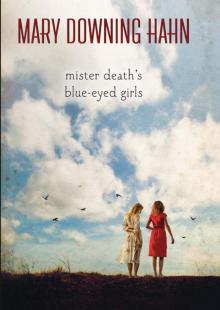 Mister Death's Blue-Eyed Girls
Mister Death's Blue-Eyed Girls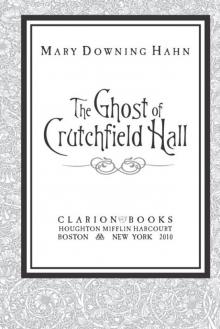 The Ghost of Crutchfield Hall
The Ghost of Crutchfield Hall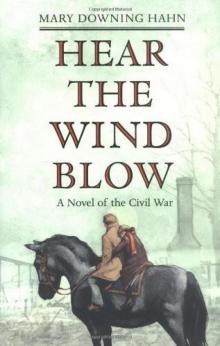 Hear the Wind Blow
Hear the Wind Blow Time of the Witch
Time of the Witch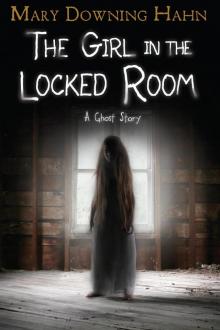 The Girl in the Locked Room: A Ghost Story
The Girl in the Locked Room: A Ghost Story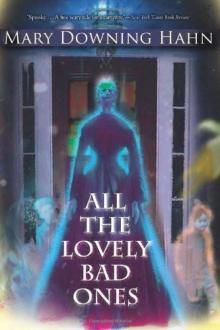 All the Lovely Bad Ones
All the Lovely Bad Ones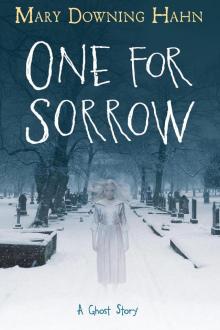 One for Sorrow
One for Sorrow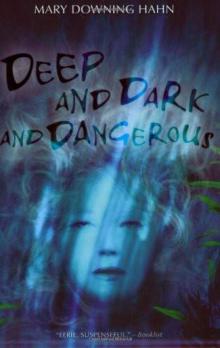 Deep and Dark and Dangerous
Deep and Dark and Dangerous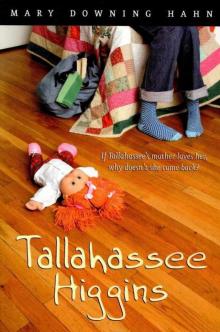 Tallahassee Higgins
Tallahassee Higgins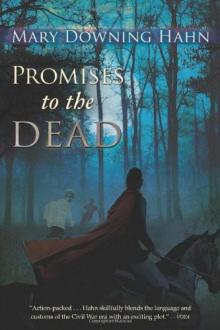 Promises to the Dead
Promises to the Dead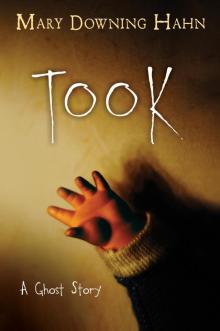 Took: A Ghost Story
Took: A Ghost Story Following My Own Footsteps
Following My Own Footsteps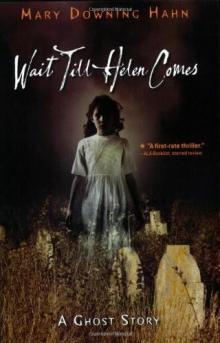 Wait Till Helen Comes: A Ghost Story
Wait Till Helen Comes: A Ghost Story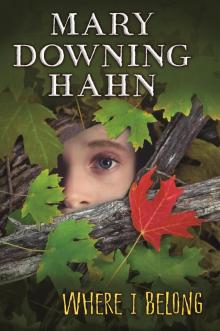 Where I Belong
Where I Belong The Spanish Kidnapping Disaster
The Spanish Kidnapping Disaster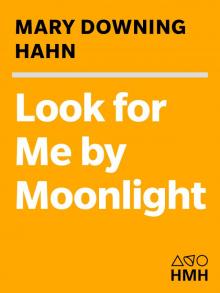 Look for Me by Moonlight
Look for Me by Moonlight The Old Willis Place
The Old Willis Place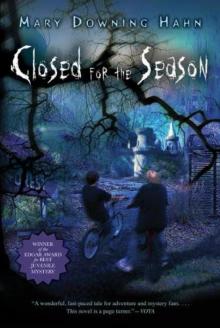 Closed for the Season
Closed for the Season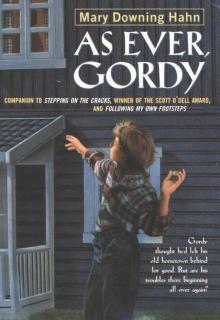 As Ever, Gordy
As Ever, Gordy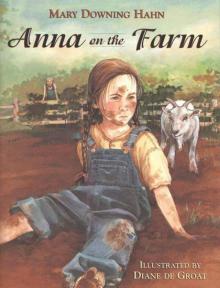 Anna on the Farm
Anna on the Farm The Doll in the Garden
The Doll in the Garden Daphne's Book
Daphne's Book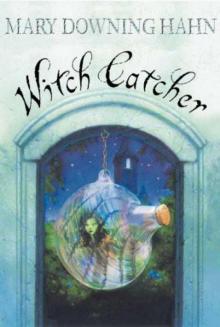 Witch Catcher
Witch Catcher The Gentleman Outlaw and Me--Eli
The Gentleman Outlaw and Me--Eli Wait Till Helen Comes
Wait Till Helen Comes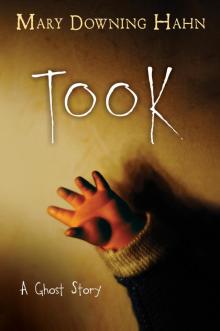 Took
Took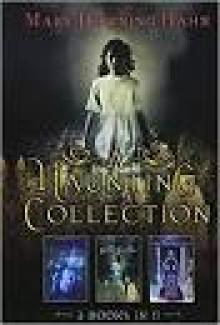 A Haunting Collection
A Haunting Collection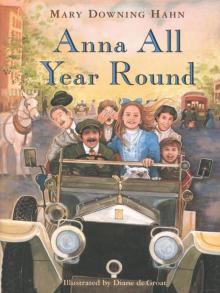 Anna All Year Round
Anna All Year Round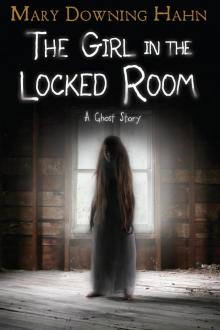 The Girl in the Locked Room
The Girl in the Locked Room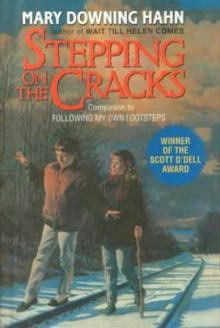 Stepping on the Cracks
Stepping on the Cracks